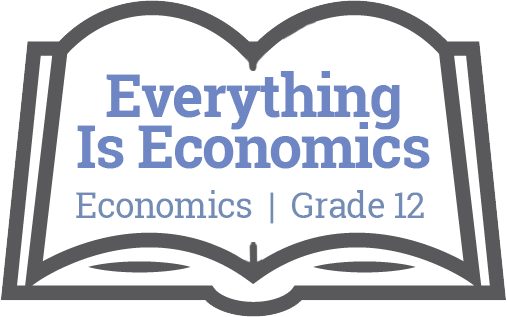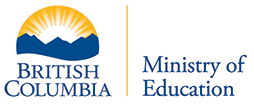
Unit Plan:
Everything Is Economics
Mastering Economic Essentials
Economics / Grade 12

Big Ideas
The implementation of economic theories has profound effects on social and political decision making and movements.
Concepts:
- Perspective and balance of power
- Patterns and habit
- Freedom of choice
- Scarcity and abundance
- Interdependence and conflict
- Nationalism and government systems
- Social systems
- Democracy
Essential Questions
Students will keep considering…
- What is the value of money beyond its monetary worth?
- Why do some societies choose one economic system over another for the economic well-being of their society?
- How are our common everyday decisions closely interconnected with how society, the environment and the economy functions?
- How do we determine what is valuable to us as individuals and a society?
Evaluative Criteria
Lesson #1 Formative
Observations
- Anecdotal
- Sticky notes
Questioning
- Decision making chart
- Challenging hypotheses
Discussion
- Challenging hypotheses
- Exit Slips
- Take knowledge ‘temperature’
Self-Assessment
- Participation
Lesson #1 Summative
- Supply and demand curve chartin-class quiz
Lesson #2 Formative
Observations
- Anecdotal using participation check
Questioning
- Framing exploratory questions worth asking
Opinion Check
- Four Corners
Lesson #2 Summative
- Letter to the Editor
- Decision-making chart
- Opening and closing arguments
Lesson #3 Formative
- Participation sticky notes
- Anecdotal observations
- Think Pair Share
- ‘Fist to Five’ or Windshield Check
Lesson #3 Summative
- Paragraph analysis of process
- In-class quiz on trade theory
Lesson #4 Formative
- Framing exploratory questions
- Think Pair Share
- Four Corners debrief
- Drawing/sketch to metaphorically represent Diminishing Marginal Utility
- Participation check boxes
Lesson #4 Summative
- 1-page essay on choice of topics related to accumulating / consuming in society
Lesson #5 Formative
Practice debate
- Whimsical topic
Kinesthetic assessment
- Tug of war line
- 4 corners
- Fist to five
Brainstorming Graphic Organizer
- KWL / Frayer
- Individual whiteboards
Observations
- Sticky notes
Lesson #5 Summative
- In-class quiz on The Tragedy of the Commons theory
- 1-5 mark on observed contributions to debate using seating plan graphic chart
Lesson #6 Formative
- Participation check list
- Pre-trial exploratory questions with challenges
- Group think using Chain of Events
- Appointment Clock technique for two research periods
- Pre-debate practice of oral / physical tips used by experienced debaters
Lesson #6 Summative
- Written central arguments submitted for pre-trial mark
- Written central questions submitted for pre-trial mark
- In-class test of Corporate Social Responsibility
- Bibliography of sources
- One-page written reflection
Lesson #7 Formative
- Student self and peer assessment
- Admit slips
- Graphic organizer of economic factors for group’s economy
- Mid-class teacher/group interview
- If/Then chart
- Duty slips
Lesson #7 Summative:
- Class presentation for thoroughness / ability to answer questions from audience
- Oral Test
- In-class test on factors forming world economies
- Essay on personal thesis regarding what should be the ultimate goal of a functioning economy ( ie. full employment, environmental sustainability, personal happiness)
Monitoring Progress
Teacher will monitor progress:
Teachers can monitor progress through ongoing formative assessment including but not limited to:
- Collaboration
- Visiting local businesses
- Participating in a classroom economic system
- Surveying school groups
- Participating in economic simulation games
- Debating
- Role Playing
- Making economic recommendations based on current facts / trends
- Evaluating systems/ businesses / trends / actions
- Inventing / innovating economic tools to solve a personal financial decision
- Pitching / presenting to class / community members
- Running a school store; Evaluating and delegating organization to receive profits
- Trading with a simulated stock portfolio
- Engaging in class discussion
- Completing exit tickets
- Sharing evidence of a recent relevant economic decision in personal life
- Performing self-directed, onsite evaluation of a large corporation (WalMart / Ikea / Toys R Us / Canadian Tire) in self- directed field trip
- Surveying a target market
- Being part of a Focus Group
- Delivering a persuasive speech to a ‘hostile’ target group in an economy (the consumer / the union / the manufacturer, the financiers, the retailer, the activist, the wealthy, the poor, the senior, the millenial, etc.)
- Analyzing a company for Fair Trade / Corporate Social Responsibility practices (coffee, fruit, T-shirts, etc)
- Quality Testing consumer goods (cheese / paper towels)
- Evaluating financial documents and economic forecasts
- Identifying real-life indicators of potential inflation, deflation, recession
- In-class quizzes and tests
- Self-reflection journals
- Portfolio presentations
- Persuasive Essay
- Oral Defense
- Graphic representations
- Metaphor representations
- Kinesthetic Assessments
- Individual Whiteboard responses
- Decision-Making Charts
Resources
WEBSITES
- Foundation for Teaching Economics
- The Canadian Foundation for Economic Education
- Econoclass.com
- The Fraser Institute
- Teaching Economics As If People Mattered
- Finding Dulcinea
- PBS.org
- Economic Education Web
- SCORE History/Social Science
- Council for Economic Education
- EconEdLink
OTHER
- A daily newspaper / newsfeed almost always provides a current Economics-related event to explore through class discussion as an opening sponge activity
Reflection
How will teachers and their students reflect on and evaluate the completed project?
Constant feedback from students and dialogue after each activity outlined in the Learning Events will help to direct and adapt what is explored in the next activity. Self, peer and teacher evaluation of the Performance Task and its alignment with the essential questions.
- In all of the above activities, journal entries, letters to the Editor, self-assessment evaluations, or emails to a friend are included at the lesson’s end as part of a reflection exercise.
- As part of their own reflective practices, teachers will pay close attention to student reactions and comments to judge engagement and use these anecdotal observations to alter, personalize, and strengthen lessons to be used the next year.
Teacher:
Next time I teach this unit I would…
Allow students to select the short stories that link to Identity.
Student:
My students needed:
Process:
Product:
Content:
Potential Student Misunderstanding:
- Money holds the same value for everyone.
- Money is distributed equally given similar circumstances in the adult world.
- Most societies value a purely capitalist approach
- The economy functions separately from people and the environment
- People always choose what’s best for themselves (or best for others).
Downloads
Unit Overview
Subject
Economics
Topic
Everything Is Economics: Mastering Economic Essentials
Unit Overview
This unit is designed to introduce secondary students to the fundamental principles underpinning the study of Economics. In senior grades, in particular, students frequently find themselves weighing imminent economic choices that will affect their lives well into the future. The following unit offers learning events that require students to take active roles in a functioning classroom economy that is highly interconnected. Lessons are designed to help students understand that apparently isolated personal economic choices always have wider financial and social implications. Instructional approaches in this unit involve authentic simulation activities, case studies, and debates on current economic issues. This unit is also structured to dispel student misunderstandings about the nature of money and how and why goods are produced, distributed, and consumed in a society. The unit’s activities are progressive in nature and allow for many entry points. Learning events in this unit can be easily differentiated for a variety of learners and grades.
.
Grade
12
Unit Duration
3-4 weeks
Related Big Ideas
Economic systems have underlying and often opposing ethical standards and implications.
Note: Interdisciplinary links include Business, Mathematics, Social Studies, Geography, and Social Justice

The following resources are made available through the British Columbia Ministry of Education. For more information, please visit BC’s New Curriculum.
Big Ideas
The Big Ideas consist of generalizations and principles and the key concepts important in an area of learning. The Big Ideas represent what students will understand at the completion of the curriculum for their grade. They are intended to endure beyond a single grade and contribute to future understanding.
Core Competencies
 Communications Competency
Communications Competency
The set of abilities that students use to impart and exchange information, experiences and ideas, to explore the world around them, and to understand and effectively engage in the use of digital media
 Thinking Competency
Thinking Competency
The knowledge, skills and processes we associate with intellectual development
 Social Competency
Social Competency
The set of abilities that relate to students’ identity in the world, both as individuals and as members of their community and society
Curricular Competencies & Content
Curricular Competencies are the skills, strategies, and processes that students develop over time. They reflect the “Do” in the Know-Do-Understand model of curriculum. The Curricular Competencies are built on the thinking, communicating, and personal and social competencies relevant to disciplines that make up an area of learning.
Additional Resources
First People's Principles of Learning
To read more about First People’s Principles of Learning, please click here.
For classroom resources, please visit the First Nations Education Steering Committee.
